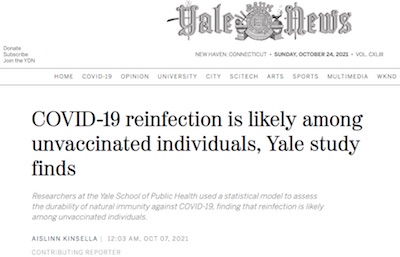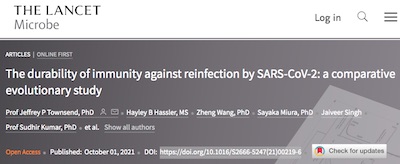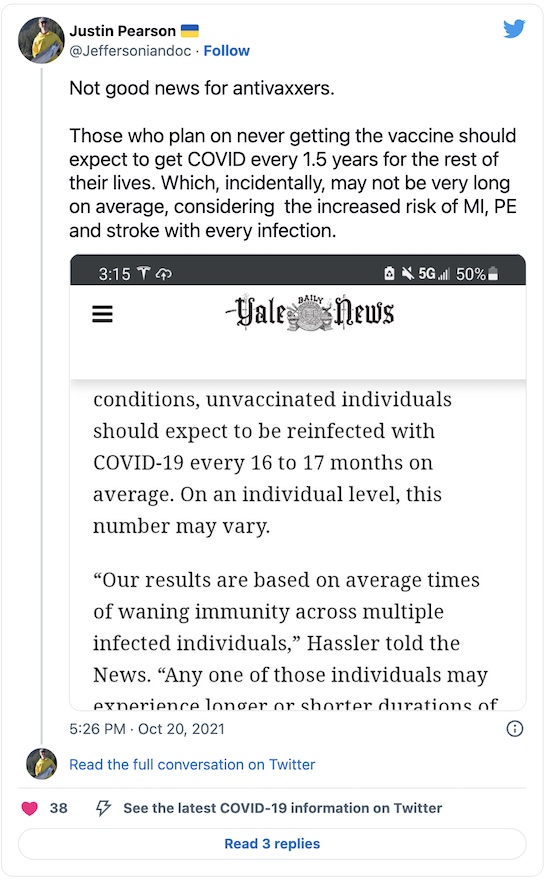On 'Natural' Immunity Persistence vs COVID-19
Tagged:COVID
/
Politics
/
Statistics
What are the consequences of relying on ‘natural’ immunity after recovery from COVID-19? Pretty grim, as it turns out.
What happens if you perpetually refuse vaccination?
First of all, if you are unvaccinated, you will get COVID-19, most likely the Delta variant. This is unavoidable, and sometimes unsurvivable or only survivable with long-term debilitating consequences.
But then what would happen after that? Would you then be immune?
We’d love to believe that immunity is more or less life-long, as with measles. But coronaviruses are unrelated to measles viruses, so there’s really no reason to expect that.
Immunity may fade with time, which means either: (a) we need periodic boosters, probably annually, or (b) we have to be really aggressive about vaccinating every single human being until we eradicate COVID-19 like we’ve eradicated smallpox. Unfortunately, unlike smallpox which is human-specific, SARS-CoV2 is present in many animal reservoirs now. [1] Unless we’re going to vaccinate all the wild, farmed, and domestic animals in the world, that reservoir is going to keep on causing zoonotic re-infections in humanity more or less forever.
So… alternative (a), periodic boosters, is the likely future.
That’s why I was struck by this (NB: “MI” = myocardial infarction, basically a heart attack; “PE” = pulmonary embolism, clotting in the lung that’s often instantly fatal):
The disturbing thing, of course, is in the delusional replies that crawled out of the woodwork:
- vaccinees have taken the Mark of the Beast, which ends in the lake of fire, or
- vaccinees should shut up and leave the unvaccinated alone, or
- vaccinees are simply too afraid of COVID, and should instead “build up” their immunity (except that’s what vaccination does), or
- … I just can’t bear to read any more replies.

 The Tweet’s author is referring to this article by Kinsella in the Yale Daily News. [2] Townsend, et al. at the Yale School of Public Health [3] used actual close relatvies of SARS-CoV-2 (classic SARS, MERS, and a couple other human coronaviruses for a total of around 6 viruses) to estimate the duration of ‘natural’ immunity for unvaccinated people:
The Tweet’s author is referring to this article by Kinsella in the Yale Daily News. [2] Townsend, et al. at the Yale School of Public Health [3] used actual close relatvies of SARS-CoV-2 (classic SARS, MERS, and a couple other human coronaviruses for a total of around 6 viruses) to estimate the duration of ‘natural’ immunity for unvaccinated people:
- At 3 months, there’s about 5% chance of reinfection.
- At 17 months, there’s a 50% chance of reinfection, i.e., you should, on average, to be reinfected by this point about 1.5 years after your first infection.
Conclusion: If you refuse vaccination, you should expect on average to get COVID-19 again, about every 1.5 years or a bit less, for the rest of your life.
Hmm… let’s suppose that you do this dumb thing, avoiding vaccination. Let us further suppose that as you keep getting COVID-19 over and over, the mortality rate creeps up a bit because it’s wearing you down. It’s varying over time and in different places [4], ranging from a few tenths of a percent to double digit percents. So let’s guess 3% mortality for you, averaged over many cycles of re-infection.
How bad can it get? Pretty bad:
> 0.97^9
[1] 0.7602311
That means: after 9 cycles of infection – just 13.5 years – 25% of you are dead!
Is that a lot?
Why, yes. Yes, it is:
- About 1/4 of the US population seem to be vaccine refuseniks for now, although as mandates take hold that will go down to the really hard core. Let’s say 15% – 16% of US residents are hardcore vaccine refusers.
- If one quarter of those vaccine refusers die within 13.5 years from repeated COVID-19 infection, that’s about 16% / 4 = about 4% of the entire US dead.
- There are 330 million people in the US, so 4% of that is 13.2 million dead in 13.5 years!
That is a… poor survival strategy.
The Weekend Conclusion
Now, you can fiddle with the numbers in that simple model if you like. Maybe the mortality rate from repeated COVID-19 reinfection is lower than 3%, or higher. Maybe the hardcore vaccine defiant fraction of the population will be less than 16%, or maybe higher. The final numbers will of course vary.
But the point is not to fixate on the number of needless deaths. The point is, however: the number is large, and it is needless. We don’t need to die like that.
We already know that although ‘natural’ immunity conveys some protection, vaccination induces stronger antibody levels. Now we see the consequences: 25% of vaccine refusers dead within 13.5 years, based on comparison with the most closely related human-infecting coronaviruses. 13.2 million dead in the US in the next 13.5 years.
Please don’t do that. Get vaccinated. You should live, and not die.
Notes & References
1: T Prince, et al., “SARS-CoV-2 Infections in Animals: Reservoirs for Reverse Zoonosis and Models for Study”, Viruses 13:3, p 494, 2021-Mar-07. PMID: 33802857, DOI: 10.3390/v13030494 ↩
2: A Kinsella, “COVID-19 reinfection is likely among unvaccinated individuals, Yale study finds”, Yale Daily News, 2021-Oct-07. ↩
3: JP Townsend et al., “The durability of immunity against reinfection by SARS-CoV-2: a comparative evolutionary study”, The Lancet Microbe, 2021-Oct-01. DOI: 10.1016/S2666-5247(21)00219-6. ↩
4: MN Hasan, et al., “The Global Case-Fatality Rate of COVID-19 Has Been Declining Since May 2020”, Am J Tropical Med & Hygiene 104:6, pp 2176-2184, 2021. PMID: 33882025, DOI: 10.4269/ajtmh.20-1496 ↩


Gestae Commentaria
Hello Dr. Weekend,
First, I’d like to thank you for providing your experienced perspective on the world of pharma in the presence of the COVID pandemic.
Second, I am a retired Chemical Engineer with decades of experience in statistical experimental design and analysis. I appreciate your sharing the details of your statistical analyses with a practiced eye myself.
Third, I practice vaccination including for COVID and am currently awaiting my time interval for a booster to pass so I can get my booster. I’ve gotten my flu shot in the interim as I do every year. My immediate community is also very highly vaccinated for COVID– no arguments against COVID vaccinations. However, I have an entire branch of my family who are rabidly, toxically individualistic wrt COVID. They haven’t asked me and I haven’t engaged them. Rabid and toxic are strongly deterrent.
Now that I have that background out of the way, my thoughts/questions about your above post:
There are at least two points I have struggled to find consistent support for. I would welcome your insight (especially references).
Estimations and modeling aside (as documented in the Townsend article), is re-infection after “natural” COVID-19 infection more likely to happen and to produce greater morbidity/mortality? I found this article: DOI: 10.1177/01632787211047932 which reviews 10 studies from around the world and concludes, based on over 9M individuals, “The protective effect of prior SARS-CoV-2 infection on re-infection is high and similar to the protective effect of vaccination.” The paper also provides reference to “Other studies have also described reduced risk of infection, morbidity, and mortality among those with prior COVID-19.” To be sure, all of these studies were completed before Delta became prominent with the last one through published in June 2021. So, two points of question: more likely re-infection and/or greater morbidity/mortality?
I agree that we are all only getting older (and so always entering greater risk category as time passes). I agree that the trend in human health, especially in the USA and Western countries in particular, is increasing obesity and other non-communicable diseases with increased morbidity/mortality risk wrt COVID infection. I agree the current (Summer/Fall 2021) hospitalization data shows the vast majority of ICU hospitalized are non-vaccinated.
I’m asking these questions because I saw your post as the only possible avenue available to change the actions of that branch of the family I mentioned above. They don’t care about others, only about themselves as individuals. I saw your post as a way to address that toxic individuality. I have one niece in that branch who I might get a toe-hold with. I think I have one and only one chance with her so I want to be completely solid with backing data I feel confident in. I accept the conclusion of the model but I also know I want data that supports that conclusion in real life.
My approach with that branch was to point out the we’re all getting older/covid risk category and what that means relative to her baby (currently 11 mo. old). If she wants to see him in adulthood, 18 years from now or average Townsend-model, 12 COVID infections from now, she should want to get vaccination. I’m preparing myself for one and only one attempt but I need to know there is data from real life to support repeat infections lead to increased morbidity/mortality.
I know we’re early in this pandemic and that real-life data post-vaccination is only now being collected. I think I’m going to hold off on my one and only attempt until that data becomes available/peer-review analyzed. I’m prepared to step-back from that branch and let Darwin do his thing. Results will out even if it takes several years for the evidence to become clear.
I hope you continue your posts evaluating data. I hope you keep an eye out for results wrt re-infection rates, morbidity and mortality.
I appreciate your efforts. Continued good health to you and yours.
*giggling out loud* Wow, the only person who used to call me “doctor” was my mother!
And BTW, I love the name “CynthesisToday”. I used to work with some absolutely brilliant medchem people who could somehow design synthesis pipelines for battleship-sized molecules that got reasonable yield and could be checked for assay drift to guarantee they were making the exact same molecule from week to week. They were good folk to know.
Nothing but sympathy from me. I have some similar friends and relatives, who refuse all vaccines for everything on some religious basis or other with which I won’t engage either.
So I sympathize with the terrible situation you’re in, because I’m in it too.
I think the real, and frustrating, truth is that we really don’t know.
And apparently all of that changes with the onset of Delta, because nothing is ever allowed to be simple. All the studies showing waning vaccine efficacy show the waning starting almost exactly at the time Delta arose. So it’s hard to say whether immunity wanes on a 9 month timescale, or we just happened to get smacked in the face with Delta 9 months after the start of mass vaccinations.
What I can say is that boosters are safe and effective, based on the data shown at the VRBPAC and ACIP meetings.
Now, there is an effect called antibody affinity maturation where the immune system actually learns to make better antibodies over time. That might lead to increased immunity with repeated re-infection. If you want to read some of the literature, just Google “antibody affinity maturation”. A lot of the top hits look pretty good to me, though I’m not an immunologist.
On the other hand, the risk of MI, PE, and stroke on each infection looks like a huge risk to take to get that affinity maturation, when you could also get it with periodic vaccination boosters and be exposed to none of those risks.
So depending on increased natural immunity – via affinity maturation or something else – is a huge gamble. Getting vaccinated is not very much of a gamble at all, given the rarity of serious side effects. That risk comparison is sort of what I was trying to communicate.
The overly simple-minded model here was intended to be accessible to people who don’t want to read through the differential equations of a SIR model, but just to see some simple arithmetic and a clear conclusion.
and so on.
All of those will change the final output number of deaths, probably drastically since it’s extrapolating an exponential. But what won’t change is those deaths will be mostly needless, avoidable by vaccination.
And that’s the point I was trying to get across to the vaccine hesitant:
So sorry I can’t nail down data that will immediately help you convince your relatives to be vaccinated. I wish I could be of more help. (And of course none of this is medical advice, because I’m not that kind of doctor. Even more importantly, I’m not your doctor.)